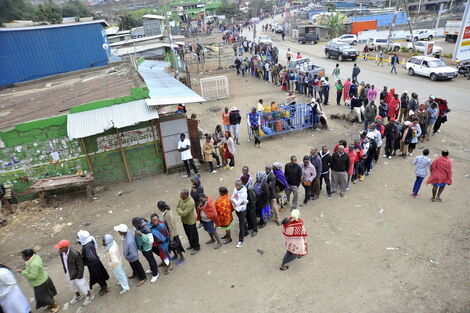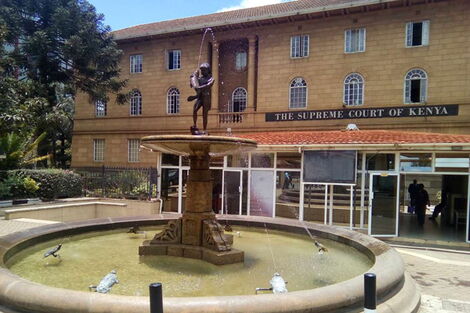Ex-IEBC CEO James Oswago Dealt Blow in Ksh1.3B Tender Case
by Imran OtienoFormer Independent Electoral and Boundaries Commission (IEBC) CEO James Oswago has been dealt a blow after a court ruled he has a case to answer over a scandal in the 2013 General Election.
The scandal involved the procurement of 30,000 Voter Identification Devices (VIDs) worth Ksh1.3 billion used in the 2013 elections.
Oswago and former Deputy Commission Secretary in charge of Support Services, Wilson Kiprotich Shollei, on Wednesday, May 27 were put on their defence for unprocedural procurement.

Voters line up along a street outside a polling station in Kiserian, Kenya on August 8, 2017.
Bloomberg
Edward Kenga Karisa and Willy Gachanja Kamanga were freed from the charges levelled against after a case was not made against them following 36 witnesses testifying.
The kits famously failed just after the polling stations opened on March 4, 2013, General Election which forced most polling stations to revert to manual tallying
The ruling for the case was initially scheduled for March 23, 2020, where the court was set to pronounce whether the persons involved had a case to answer.
The initial case against Oswago was adjourned back in June 2018 by Milimani Principal Magistrate Felix Kombo of the Anti-Corruption Court.
This was after former IEBC vice-chairperson Lilian Bokeeye Mahiri-Zaja and other prosecution witnesses completed their testimony.
Oswago was arrested back in October 2013 alongside former deputy secretary in charge of support services Wilson Shollei, finance and procurement director Edward Karisa and acting procurement manager Willy Kamanga.
The four were charged with abuse of office and failing to comply with procurement regulations relating to electronic voter identification kits which failed during the March 4, 2013 elections.
The kits were supplied by Face Technologies, a South African company that strongly defended the electronic voters’ identification devices (EVID) kits, insisting they never failed.
Oswago had also been also named in ‘chickengate’ scandal as electoral and examination officials are alleged to have received more than Kshh50 million in bribes to award contracts to a UK printing firm.

A picture of the Supreme Court of Kenya.